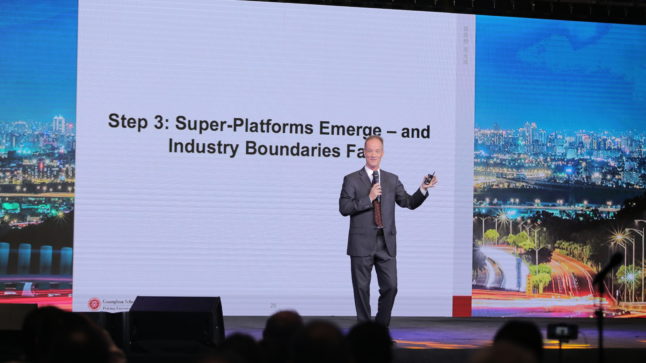Three big things are happening in digital China right now.
- The coronavirus is radically altering the behavior of hundreds of millions of consumers (and businesses), resulting in what is being called the quarantine economy. Everyone is trying to move from in-person to digital interactions.
- This shift to digital interactions is supercharging and rapidly evolving China’s +1B person digital-first consumer network, a phenomenon I have written a lot about.
- The #1 go to solution is live streaming, especially Taobao Live and JD Live.
It’s pretty amazing. My argument for this is below.
Point 1: Digital China is the world’s first +1B person digital-first consumer network.
In previous articles, I have argued that Chinese consumers are acting more and more like a connected digital network. They are transacting, communicating, sharing, doing payments and lots of other digital interactions at an impressive rate. And this is the real engine of digital China, not business or government. I call this the China Digital Consumer Network (CDCN), which has two interesting aspects.
- First, as Metcalfe’s Law has long argued, the number of connections in a network grows greater than linearly with the number of nodes in a network. So as you add a new a consumer (i.e., a node), it creates connections with all the existing consumers. In theory, this means that while China has 4x the consumers of the US, its consumer network has 17x the number of connections. Although, I do think Metcalfe’s Law is mostly wrong in practice, which I wrote about in “Metcalfe’s Law is Dumb” (subscribers only).
- Second, Chinese consumers are digital-first in their behavior. It’s not really the number of connections in a network (i.e., Metcalfe’s Law) that matters. For example, I don’t need to communicate with all 2.7B people on Facebook. It’s really about the number of connections that are valuable to users – and the amount and quality of activity and interactions along those connections. And this is where China is so important because Chinese consumers are very active digitally by every measure. They create more content. They spend more time online. They are more rapid adopters of new tools and services. Chinese consumers are digital-first in their behavior and that makes the CDCN far more important.
Hence, my claim that digital China is the world’s first +1B person digital-first consumer network.
And this is why coronavirus is different than SARS. Because in 2002-2003, the digital China network didn’t yet exist. It was still +8 years before Chinese consumers started buying smartphones and becoming digitally connected. It was 12 years before mobile payments. And JD didn’t even exist online.
Which brings me to my second point.
Point 2: The coronavirus “quarantine economy” is driving tons of activity onto the digital network.
How do you work, shop, eat, play, and learn if you don’t want to interact with people in person? How does life and the economy return to normal when hundreds of million people are formally or quasi-quarantined in reality or in their behavior?
Well, you switch from in-person to digital interactions.
You try to work, shop, eat, play, learn and everything else via your smartphone and the China Digital Consumer Network. And that is exactly what is happening in the quarantine economy. The go to solution to every problem right now has been digital connectivity.
In person interactions are shifting digital on a huge scale in China. We are seeing tons of stories about the changing behavior of Chinese consumers as they try to avoid in person human interactions. For example:
- Education: Students are doing classes by watching their teachers live stream.
- Fitness: At-home fitness equipment and mobile apps are taking off. Basically nobody wants to go to a gym so it’s about video, apps and in-home equipment. There is lots of demand for rowing machines and yoga mats.
- Dining at home: Chefs from popular restaurants are live streaming to teach viewers how to make dishes at home. Some hotpot chains have even been doing live streaming sessions where viewers request hosts to eat their favorite hotpot items on their behalf. Which is kind of weird.
- At home culture:
- On Valentine’s Day, Chinese celebrities broadcast a 4-hour concert on Taobao Live to 4 million viewers.
- Over 10 million visitors participated in Taobao Live’s virtual tour of national museums.
- Bookstore chain Zhongshuge hosted seven live streaming sessions this month, including storytelling streams for children.
- Other: Nightclubs apparently are doing live streaming of their shows and events. I’m not really sure what these include.
We are just seeing a ton of new digital interactivity on the network. And you probably noticed that virtually all of them mention live streaming. Which brings me to my final point.
Point 3: The quarantine economy is driving businesses onto the network to sell to their customers. And this means live streaming.
Shopping malls, auto dealerships, cinemas and department stores have not traditionally been that digitally active. They might do some digital marketing and some limited online sales. And they might have reviews online. But they, by and large, wait for people to come to the store and do business in person.
But many brands, retailers and merchants are realizing that consumers may not be coming back into physical stores any time soon. About half of China is now back at work. The economy has to restart. But that does not mean Chinese consumers are coming back to the stores, shopping malls, movie theaters, restaurants and tourist destinations. So these businesses, large and small, are flooding online in an attempt to reach their customers. They have no choice. And this means engaging with the CDCN.
Some examples:
- Cosmetics brand Forest Cabin temporarily closed half its +300 stores. And the still open stores didn’t have a lot of traffic. So they focused on live streaming and trained +1,600 shop attendants how to use Taobao Live. Alibaba reports the brand added 3,000 new loyalty members a day.
- Intime’s department stores (owned by Alibaba) are also training their sales associates how to live stream from their homes.
- Real estate agents are jumping into live streaming and social media. Apartment tours are moving online.
- Furniture retailer Easyhome has said staff from 232 of its stores have broadcast +4,800 sessions in a week, reaching 3.58 million viewers.
- Auto dealers are starting to showcase the interiors of luxury cars online.
- Even cinemas are trying to sell online. Alibaba has launched a service that lets cinemas sell their popcorn online. Over twenty cinema companies are linked to ele.me so you can eat popcorn at home.
Here are some photos from a live stream session by Viya on Taobao Live, the #1 live streamer in China by revenue (apparently).
As the most immediate goal for these businesses is to bring in revenue, the first tool they are reaching for is live streaming. However, these businesses will learn that you need to build and maintain customer relationships in order to sell online. I expect to begin to focus more on social media (Weibo, WeChat) and digital CRM.
That’s it. In Part 2, I talk about how all of this is resulting in an upgrade for China’s logistics network.
Cheers, -j
———-
I write, speak and consult about how to win (and not lose) in digital strategy and transformation.
I am the founder of TechMoat Consulting, a boutique consulting firm that helps retailers, brands, and technology companies exploit digital change to grow faster, innovate better and build digital moats. Get in touch here.
My book series Moats and Marathons is one-of-a-kind framework for building and measuring competitive advantages in digital businesses.
Note: This content (articles, podcasts, website info) is not investment advice. The information and opinions from me and any guests may be incorrect. The numbers and information may be wrong. The views expressed may no longer be relevant or accurate. Investing is risky. Do your own research.




